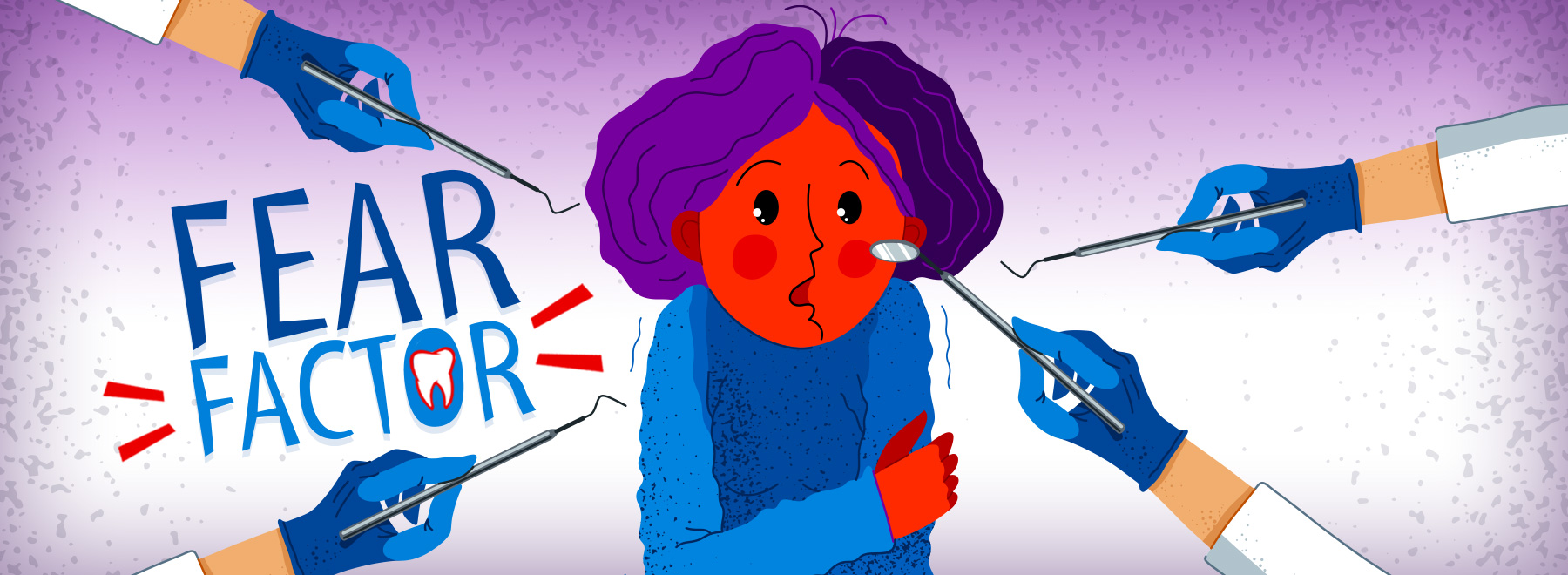Compassionate care eases anxiety during dental visits
If you’re anxious at the thought of going to the dentist, or get shaky once you sit down in the exam chair, you’re not alone – and you have a condition called dentophobia.
People with dentophobia, also called dental phobia or otontophobia, have a fear of dentists or dental procedures. It could be because of a previous traumatic or painful experience at the hands of a dentist or dental hygienist. It might be triggered by a sound – for example, a drill – or the smell experienced when you walk into a dental office.
When a dental phobia is severe, it can lead to the patient not seeking treatment, even if they’re in pain, and not practicing good oral health.
And although most dental fears are irrational or overblown, “just because I know it’s unreasonable doesn’t mean it’s not there,” said Dr. Samantha Allen, a general dentist practicing in Sardis and a 2022 graduate of the University of Mississippi Medical Center School of Dentistry.
“The physical response of fear and heart-racing and shaking still occurs,” she said.
Allen speaks from experience. She’s suffered from dental phobia from an early age after receiving inadequate oral health care as a child. Allen uses her empathy as a path to compassionate understanding and the desire to work with her patients to find the root of their fears, then to help the patient overcome or lessen them.
About 36 percent of people nationally cope with fears about dental treatment, and of that percentage, about 12 percent have an extreme fear, the Cleveland Clinic says. It’s more common in females than males.
Some of the most common:
- Fear of anesthetics. Some patients fear that it won’t numb the affected area, or that temporary numbing of the lips could be permanent.
- Fear of blood or bleeding.
- Fear of choking when the mouth is numbed, or when the dentist must use tools or gauze in the mouth.
- Fear of pain during a procedure, and pain while recovering from a procedure such as a root canal or removal of wisdom teeth.

“The most common thing I perceive is patients who have a general anxiety of just being in the room or in the chair,” said Dr. James Lott, associate professor of Care Planning and Restorative Sciences and assistant dean for education.
“Typically, it’s precipitated from some previous event that they’ve had that was traumatic for them. Some of my patients have said, ‘I don’t enjoy being here – no offense to you.’
“On the younger level, it can be parental induced, where they parents say, ‘They’re going to give you a shot,’ or ‘If you don’t brush your teeth, you’ll get a cavity,’” Lott said. “A line some parents use, which is terrible, is ‘If you don’t behave, I am going to take you to the dentist.’
“They don’t try to motivate their child to do well.”
It’s important to take the time to find out what’s causing a patient’s phobia, Allen said. “For each patient, it’s different,” she said.
“I have a patient who, the first time they went to the dentist, had 15 cavities and was numbed in all four quadrants of their mouth. He ended up with Bell’s palsy,” Allen said. “No one knows if it was directly related to the procedure, but all he knows is that he had fillings done, and then he had a paralyzed face.”
Allen said she eased his fears by explaining how medications used in her office work, “and that I would use a short-acting medication to make sure he felt comfortable and didn’t have to fear that his face wouldn’t wake up.”
She’s seen patients who “were scared of drowning in the dentist’s office. Water in the back of their mouth terrified them because they might have had an experience falling into a lake and almost drowning.”
Allen troubleshoots to find out why a patient is experiencing a fear, then finds a work-around to help the patient. “For the patients who were afraid of drowning, we turned their head to the side so that the water wouldn’t pool in their mouth,” she said.
Patients who fear not being able to breathe or suffocating during a procedure “have great challenges, and allergy season is worse for them,” Allen said. “So, we try not to treat them during allergy season.”
Both Allen and Lott recommend noise-canceling headphones for patients who fear the sound of a drill.
Sometimes, it’s almost impossible to escape some level of pain at the dentist’s office.
“Honesty is my first policy,” Lott said. “I don’t like saying it won’t hurt if you have to give them an injection. I tell them that this will hurt for 5-10 seconds when it goes in, and then it will subside.”
Lott says communication between patient and dentist is critical to making sure they aren’t surprised by something they find unpleasant. “I find myself talking out loud the steps I’m taking: I’m fixing to blow some air. I’m fixing to place a cotton roll in your mouth.
“I try to make the unknown a little more known to them. If you verbalize it, they often appreciate the information.”
“Patients need to get the care that they need, knowing that someone understands them and will give them the accommodations that they need,” Allen said. “I take my time and make sure that I’m using all the techniques that are available to me.”
To make an appointment for dental care at the School of Dentistry, call (601) 984-6185.
The above article appears in CONSULT, UMMC’s monthly e-newsletter sharing news about cutting-edge clinical and health science education advances and innovative biomedical research at the Medical Center and giving you tips and suggestions on how you and the people you love can live a healthier life. Click here and enter your email address to receive CONSULT free of charge. You may cancel at any time.



